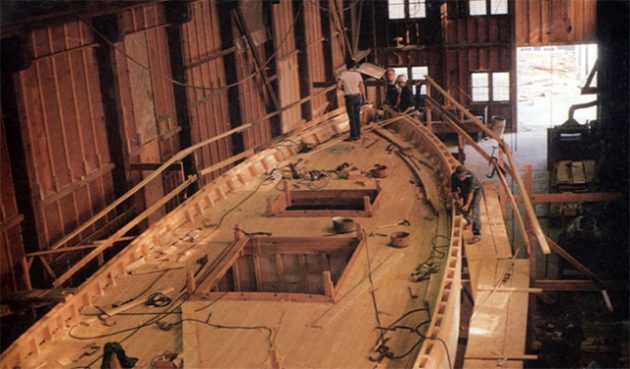Skills gap is “holding back” Britain’s boatbuilding industry
Research by British Marine has revealed that Britain's marine industry is being held back because of the inability to recruit skilled workers. Industry leaders now want the sector to be a core part of the Government's Industrial Strategy.
British Marine, which represents the leisure, superyacht and small commercial marine industry, says Britain’s boatbuilders are hiring, but face a significant skills gap.
It is warning that the inability to recruit skilled workers is holding back growth.
Leaders within the industry are now calling for the sector to be core part of the Government’s Industrial Strategy.
According to British Marine, recruitment across Britain’s marine industry increased by 2.7% in 2014/15 and is expected to increase a further 2% in 2015/16.
The majority of work force growth has come from the boat manufacturing (20%), equipment supply chain (20%), and boat distribution and retail (15%) sectors.
The industry’s 4,500 businesses now employ 31,600 people.
However, British Marine has revealed that 30% of companies have identified critical skills gaps that are holding their business back.
Technical skills are the biggest obstacle to recruitment: 74% of businesses cited a lack of technical training (such as in manufacturing and engineering) as a barrier.
This compares to the UK wide average of 41%.
“For an industry where one in two jobs are in boat building and repairs and equipment manufacturing (34% and 13% respectively) the need to plug the skills gap is becoming more important for future growth,” said British Marine in a media release.
So-called soft skills, such as common sense, attitude and the ability to communicate, are also a concern: 24% of businesses identified a lack of soft skills as a barrier to finding the right candidates. This has led to a big push in soft skills training.
Competition from other sectors is also a factor.
One in three (32%) of businesses said that competition from other industries affects their ability to recruit. This compares to the national average of 8%.
Commenting on the findings, which were released at the Southampton Boat Show 2016, the chief executive of British Marine, Howard Pridding, said: “The marine industry is dynamic and growing. We offer variety, good pay and opportunities to work at some world leading companies.”
“Businesses want to take on more staff but a lack of relevant skills is a barrier and while many of our members are taking on the challenge themselves, more can be done by Government to back the industry,” continued Pridding.
“We welcome the renewed emphasis on an industrial strategy but it is crucial that the marine sector forms a central part of any plan and is given the support it needs,” he concluded.
The research also revealed that 83% of companies in the sector are either small businesses with turnover between £200,000 and £999,999 (26%) or micro businesses (57%) with turnover up to £199,999.
Moreover, the UK marine industry is a haven for start-ups with over 50 new businesses registered in the last year.
If these companies are to grow further, they need access to a suitably skilled workforce.
Co-founder and sales director at Williams Jet Tenders, Mathew Hornsby, commented: “We are seeing demand for British boats from all over the world, particularly in the USA. We are growing and we want to hire more people to meet this demand, but a lack of specialist manufacturing skills in the market is a future challenge for the industry.”
“We’ve increased our workforce by 15% in the last twelve months with full-time employees and apprentices,” said Hornsby, who is exhibiting at the Southampton Boat Show this week.
“However, the pool of talent isn’t infinite. We’re making a big push to expand the training opportunities we offer and engage with the next generation of our workforce. The marine industry is an important contributor to the economy and part of our country’s heritage – we should be supported more by Government,” he continued.
“We’ve set up our own apprenticeship scheme, taking 14-15 year olds in our local community and running a Saturday morning boatbuilding school. If successful, the youngsters progress on to a full-time apprenticeship position with Williams Jet Tenders,” concluded Hornsby.
Across the industry, businesses are taking on the skills gap by themselves, turning to apprenticeships or training-up people in house, rather than relying on a flow of talent from other markets or their competitors.
One of Britain’s largest yacht manufacturers, Princess Yachts, currently employs 91 apprentices. As a whole, the marine industry has 470 apprentices across 100 businesses.
British Marine’s findings also reveal that three quarters of apprenticeships are in manufacturing and engineering (43% boat manufacturing, 21% repairs and servicing, 8% equipment manufacturing), while 11% of apprentices are employed by the tourism sector.
Over half of businesses that employ more than 10 people provide comprehensive training. Technical and regulatory training dominates, accounting for almost 80% of internal training provision.
Improving soft skills is a priority, with training in this area accounting for 37% of internal training and 27% of external training.
Sunseeker achieves £25M retail sales at Cannes Boat Show
Sunseeker has announced that it moved back in to profit in the second quarter of 2016 with a forecasted overall…
Southampton Boat Show 2016: Best new launches
Watch MBY's Jack Haines present all the new launches from the Southampton Boat Show 2016.
“Positive” Southampton Boat Show for Spirit Yachts
The Suffolk-based luxury boat builder, Spirit Yachts, is reporting a "very positive" Southampton Boat Show, with strong interest in its…












